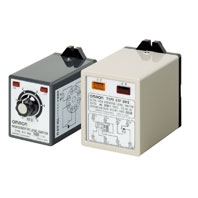Floatless Level Switch (Ultra High-sensitivity Type)
61F-UHS / HSL
 Ideal for Detecting Ice, Pure Water, or Humidity
Ideal for Detecting Ice, Pure Water, or Humidity
Specifications
|
Item |
High-sensitivity 61F-UHS |
Variable high-sensitivity 61F-HSL |
|
Supply voltage |
100, 200, or 220 VAC; 50/60 Hz |
24, 100, 110, 200, or 220 VAC; 50/60 Hz |
|
Operating voltage range |
85% to 110% of rated voltage |
|
|
Interelectrode voltage |
24 VAC |
13 VDC max. |
|
Interelectrode current |
Approx. 1 mA AC max. |
Approx. 1 mA DC max. |
|
Power consumption |
3.2 VA max. |
|
|
Interelectrode operate |
0 to approx. 1 MΩ *1 |
0 to approx. 5 MΩ (variable) |
|
Interelectrode release |
Approx. 5 M to ∞ Ω |
Operate resistance + 2.5 MΩ max. |
|
Cable length |
5 m *2 |
*3 |
|
Control output |
0.3 A, 220 VAC (Inductive load: cosφ = 0.4) |
2 A, 220 VAC (Inductive load: cosφ = 0.4) |
|
Ambient temperature |
Operating:-10 to 55°C |
|
|
Ambient humidity |
Operating:45% to 85% RH |
|
|
Insulation resistance |
100 MΩ max. (at 500 VDC) |
|
|
Dielectric strength |
2,000 VAC, 50/60 Hz for 1 min |
|
|
Life expectancy |
Electrical: 50,000 operations min. |
Electrical: 500,000 operations min. |
|
Weight |
Approx. 380 g |
Approx. 240 g |
1. Use 61F-UHS for detecting water leakage with high specific resistance. Connect a sensor cable between terminals 1 and 7.
2. Two Electrodes can be connected to the 61F-HSL. Use them for an alarm, not for creating a self-holding circuit.
3. The length when using completely-insulated, 600-V, 3-conductor (0.75 mm2) cabtire cables. Usable cable lengths will become shorter as the cable diameter or number of conductors becomes larger. For more details, refer to Safety Precautions for Floatless Level Controllers.
4. It is recommended that the cable length be kept as short as possible since the Electrode circuit current is at DC micro-current level. Moreover, the Electrodes will corrode rapidly if the current is allowed to constantly flow between the Electrodes. Be careful with the electrode polarity and grounding when wiring.




